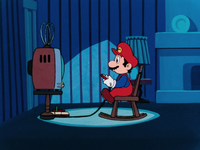Family Computer: Difference between revisions
No edit summary |
|||
| Line 15: | Line 15: | ||
[[File:TheGreatMissionMarioPlayer.png|thumb|Mario playing his Famicom.]] | [[File:TheGreatMissionMarioPlayer.png|thumb|Mario playing his Famicom.]] | ||
*In ''[[WarioWare, Inc.: Mega Microgame$!]]'', 9-Volt owns a Famicom system which can be seen in the upper-left corner of the screen during his introduction cutscene. | *In ''[[WarioWare, Inc.: Mega Microgame$!]]'', 9-Volt owns a Famicom system which can be seen in the upper-left corner of the screen during his introduction cutscene. | ||
*In ''[[Super Mario Bros.: Peach-hime Kyushutsu Dai Sakusen!]]'', [[Mario]] himself owns a | *In ''[[Super Mario Bros.: Peach-hime Kyushutsu Dai Sakusen!]]'', [[Mario]] himself owns a Famcom, on which he plays an unnamed video game which bears some similarities to ''[[Super Mario Bros.]]''. [[Princess Peach]] and [[Bowser|King Koopa]] also teleport through the television to which the Famicom is connected, although they do not appear to have any role at all in the game Mario is playing. | ||
{{BoxTop}} | {{BoxTop}} | ||
{{NES}} | {{NES}} | ||
Revision as of 10:02, April 11, 2016
Template:System-Infobox Template:LLQuote
The Family Computer (often shortened to Famicom) is the Japanese equivalent of the Nintendo Entertainment System, or the NES. The Family Computer's controllers were attached to the main unit, unlike the NES, and could be stored on the sides of the system. Player One's controller can pause the game, and Player Two's controller has audio controls. The cartridges were half the size of the NES's, and were inserted in the top instead of through a door in the front (like on the NES). Instead of looking like a vertical cartridge, like the NES, it more closely resembles a SNES cartridge, but can be found in different colors, such as gray, yellow, and blue.
The console was released in 1983, but in February 1986 the Family Computer Disk System was released as an accessory for the Family Computer. This accessory enabled games to be played on the Family Computer in the form of a disk. Many newer games were released only on the Disk System that were never released on the NES or Family Computer. Sharp Corporation also manufactured the Twin Famicom, a Family Computer combined with the Disk System add-on in one piece of hardware, but it was only released in Japan.
Appearances in the Mario series
- In WarioWare, Inc.: Mega Microgame$!, 9-Volt owns a Famicom system which can be seen in the upper-left corner of the screen during his introduction cutscene.
- In Super Mario Bros.: Peach-hime Kyushutsu Dai Sakusen!, Mario himself owns a Famcom, on which he plays an unnamed video game which bears some similarities to Super Mario Bros.. Princess Peach and King Koopa also teleport through the television to which the Famicom is connected, although they do not appear to have any role at all in the game Mario is playing.
